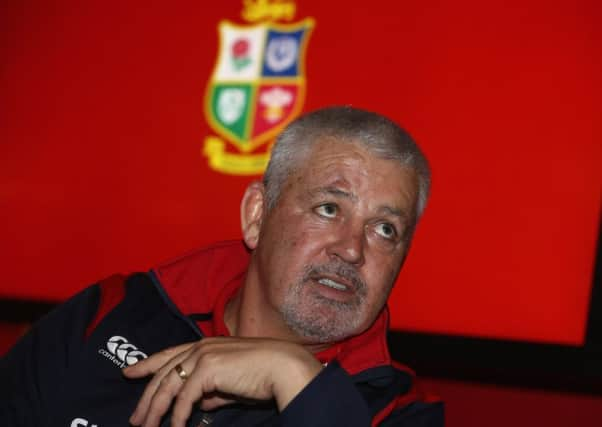Allan Massie: Lions talk ahead of Six Nations is tiresome


Now I don’t know the inside story. I suspect Townsend was tempted; he was after all a star of the 1997 Lions tour of South Africa. But I imagine he felt that, as the new Scotland coach, his first loyalty was to the SRU and Scotland’s own summer tour in Australia. He may also, reasonably, have supposed that under Gatland opportunities for any innovative attack coach would be severely limited. Be that as it may, he turned down the offer, and Gatland has behaved badly in suggesting that he would have accepted it if the SRU hadn’t leaned on him. It smacks of an attempt to provoke ill-feeling.
Four years ago I expressed the view in this column that the Lions belonged to the old amateur era and should now be scrapped. It’s ridiculous in the professional world that four countries should come together to play one country. A Lions tour is now primarily a commercial enterprise and an unnecessary one. Admittedly it arouses huge interest. Supporters will travel eagerly to New Zealand, and millions will get up early to sit in front of the television. Even with Gatland in charge there will be some enthralling rugby, and, like most who love the game, I shall watch the matches with, probably, enjoyment.
Advertisement
Hide AdAdvertisement
Hide AdNevertheless there is a downside, and not only because, as things are now, either England or Ireland would have as good a chance of winning a series in New Zealand as the cobbled-together Lions team. Speculation about the Lions – who’s in, who’s out – will dominate the Six Nations throughout the spring, and this will to some extent devalue the Six Nations, as each match involving England, Ireland, Scotland and Wales is treated by the media as a Lions Trial.
Meanwhile it’s more interesting to consider the Six Nations in the light of the autumn internationals. England came through unbeaten thanks to some tremendous defence in the first half against Australia, an equally tremendous 20 minutes after the interval, and some sympathetic refereeing. Ireland, despite injuries, looked very good indeed, even if they failed to repeat their Chicago win against the All Blacks whose tackling – on and off the ball – in Dublin was brutal and often illegal. Wales won three matches after being dreadful against Australia, and were indeed lucky to beat Japan who made them look ponderous and short of ideas. Nevertheless, we should remember that Wales usually play better in the Six Nations than in the autumn.
We won two out of three quite convincingly, but the surrender of a winning position to Australia will rankle for some time. It’s true that we would have won if Greig Laidlaw’s last kick at goal had been a couple of inches to the left, but close matches are often decided on such narrow margins. On the credit side too was the introduction of a number of players who look ready for international rugby: Huw Jones, Hamish Watson, most obviously; then the young props Zander Fagerson and Alan Dell, and in brief cameos Magnus Bradbury and Ali Price.
We have more strength in depth than for years, but still not enough, given the physicality of the modern game and the certainty, rather than merely the likelihood, of injuries. Conventional wisdom now has it that, to be successful, a national team requires to have three players of genuine Test match quality for every position. In 1984 Scotland used only 18 players in the four matches which secured a Grand Slam. Nothing like that will ever be seen again.
England and Ireland are in the position, or very near to it, of having the requisite 45 players. We are a long way short. Strangely, given that it was so long a problem area, we have sufficient cover in the centre with Alex Dunbar, Huw Jones, Mark Bennett, Duncan Taylor, Matt Scott and Peter Horne – if all are ever fit at the same time; perhaps at scrum-half with Laidlaw, Price and Henry Pyrgos; almost there in the back-row where John Barclay, Hamish Watson, Ryan Wilson, John Hardie, Josh Strauss, Magnus Bradbury and David Denton (when he is fit again) compete for places. But elsewhere we are still thin on the ground. We may have first reserves, but not really second ones. We would be in trouble if we had to go into a Six Nations match without Stuart Hogg, Finn Russell or either Jonny or Richie Gray. Take out a couple of these – Tommy Seymour perhaps also – and you would be rash to back us to beat anyone.